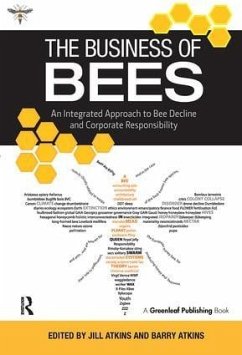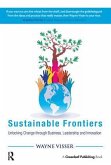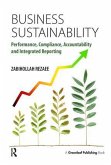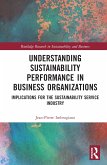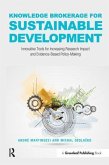The Business of Bees
An Integrated Approach to Bee Decline and Corporate Responsibility
Herausgeber: Atkins, Jill; Atkins, Barry
The Business of Bees
An Integrated Approach to Bee Decline and Corporate Responsibility
Herausgeber: Atkins, Jill; Atkins, Barry
- Gebundenes Buch
- Merkliste
- Auf die Merkliste
- Bewerten Bewerten
- Teilen
- Produkt teilen
- Produkterinnerung
- Produkterinnerung
The Business of Bees provides the first integrated account of diminishing bee populations from an interdisciplinary perspective. It explores the role of corporate responsibility and governance as they relate to this issue and examines what the impact will be on consumers, companies, stock markets and global society if bee populations continue to decline.
Andere Kunden interessierten sich auch für
![Sustainable Frontiers Sustainable Frontiers]() Wayne VisserSustainable Frontiers140,99 €
Wayne VisserSustainable Frontiers140,99 €![Business Sustainability Business Sustainability]() Zabihollah RezaeeBusiness Sustainability143,99 €
Zabihollah RezaeeBusiness Sustainability143,99 €![Social Entrepreneurship and Social Innovation Social Entrepreneurship and Social Innovation]() Social Entrepreneurship and Social Innovation181,99 €
Social Entrepreneurship and Social Innovation181,99 €![Understanding Sustainability Performance in Business Organizations Understanding Sustainability Performance in Business Organizations]() Jean-Pierre ImbrogianoUnderstanding Sustainability Performance in Business Organizations160,99 €
Jean-Pierre ImbrogianoUnderstanding Sustainability Performance in Business Organizations160,99 €![Negotiating Change Negotiating Change]() Mike LotzofNegotiating Change181,99 €
Mike LotzofNegotiating Change181,99 €![Activism and the Fossil Fuel Industry Activism and the Fossil Fuel Industry]() Andrew CheonActivism and the Fossil Fuel Industry181,99 €
Andrew CheonActivism and the Fossil Fuel Industry181,99 €![Knowledge Brokerage for Sustainable Development Knowledge Brokerage for Sustainable Development]() André MartinuzziKnowledge Brokerage for Sustainable Development181,99 €
André MartinuzziKnowledge Brokerage for Sustainable Development181,99 €-
-
-
The Business of Bees provides the first integrated account of diminishing bee populations from an interdisciplinary perspective. It explores the role of corporate responsibility and governance as they relate to this issue and examines what the impact will be on consumers, companies, stock markets and global society if bee populations continue to decline.
Hinweis: Dieser Artikel kann nur an eine deutsche Lieferadresse ausgeliefert werden.
Hinweis: Dieser Artikel kann nur an eine deutsche Lieferadresse ausgeliefert werden.
Produktdetails
- Produktdetails
- Verlag: Taylor & Francis
- Seitenzahl: 366
- Erscheinungstermin: 10. Juni 2016
- Englisch
- Abmessung: 236mm x 155mm x 25mm
- Gewicht: 680g
- ISBN-13: 9781783535224
- ISBN-10: 1783535229
- Artikelnr.: 43864670
- Herstellerkennzeichnung
- Libri GmbH
- Europaallee 1
- 36244 Bad Hersfeld
- gpsr@libri.de
- Verlag: Taylor & Francis
- Seitenzahl: 366
- Erscheinungstermin: 10. Juni 2016
- Englisch
- Abmessung: 236mm x 155mm x 25mm
- Gewicht: 680g
- ISBN-13: 9781783535224
- ISBN-10: 1783535229
- Artikelnr.: 43864670
- Herstellerkennzeichnung
- Libri GmbH
- Europaallee 1
- 36244 Bad Hersfeld
- gpsr@libri.de
JILL ATKINS holds a Chair in Financial Management at Sheffield University Management School and is a visiting professor at the University of the Witwatersrand, South Africa. BARRY ATKINS has a background in script-writing and editing for BBC Radio and TV.
PrefaceAcknowledgementsPart I: The historical
scientific
cultural
philosophical and deep ecology context of bee decline1. Bee decline: An integrated approach Jill Atkins
University of Sheffield
UK Barry Atkins
University of South Wales
UK2. The historical
cultural and philosophical context of bee decline Jill Atkins
University of Sheffield
UK Barry Atkins
University of South Wales
UK3. Bee bio-basics and conservation benefits: Essential pieces in the pollinator puzzle Scott Longing and Samuel Discua
Texas Tech University
USA4. From corporate social responsibility to accountability in the bumblebee trade: A Japanese perspective Carol Reade
San José State University
USA Koichi Goka
National Institute for Environmental Studies
Japan Robbin Thorp
University of California
Davis
USA Masahiro Mitsuhata
Arysta LifeScience Corporation
Japan Marius Wasbauer
University of California
Davis
USA5. Bombus terrestris: A personal deep ecology account Jack Christian
Manchester Metropolitan University Business School
UKPart II: Investors
bees and the stock market6. The bee and the stock market: An overview of pollinator decline and its economic and corporate significance Rick Stathers
Schroders
UK7. Pollinators as a portfolio risk: Making the case for investor action Abigail Herron
Aviva Investors
UK8. Bees and pesticides: The Ontario controversy Margaret Clappison and Aris Solomon
Athabasca University
Faculty of Business
Canada9. Bee colony and food supply collapse: Could investors be the cavalry? Raj Thamotheram and Olivia Stewart
Preventable Surprises
UKPart III: Accounting for bees and bee decline10. How to account for bees and pollinators? Joël Houdet
African Centre for Technology Studies (ACTS)
Kenya Ruan Veldtman
South African National Biodiversity Institute (SANBI)11. Bee accounting and accountability in the UK Jill Atkins
University of Sheffield
UK Elisabetta Barone
Brunel University
UK Warren Maroun
University of the Witwatersrand
South Africa Barry Atkins
University of South Wales
UK12. Accounting for bees: Evidence from disclosures by US listed companies Andrea M. Romi and Scott D. Longing
Texas Tech University
USA13. No bees in their bonnets: On the absence of bee-reporting by South African listed companies Warren Maroun
University of the Witwatersrand
South Africa14. Corporate bee accountability among Swedish companies Kristina Jonäll
Gothenburg University
Sweden Gunnar Rimmel
Jönköping University
Sweden15. Bees and accountability in Germany: A multi-stakeholder perspective Christoph F. Biehl
Henley Centre for Governance
Accountability and Responsible Investment
UK Martina N. Macpherson
Sustainable Investment Partners Ltd
UK16. An integrated approach to bee decline: Making a bee line for the future? Jill Atkins
University of Sheffield
UK Barry Atkins
University of South Wales
UKAbout the authors
scientific
cultural
philosophical and deep ecology context of bee decline1. Bee decline: An integrated approach Jill Atkins
University of Sheffield
UK Barry Atkins
University of South Wales
UK2. The historical
cultural and philosophical context of bee decline Jill Atkins
University of Sheffield
UK Barry Atkins
University of South Wales
UK3. Bee bio-basics and conservation benefits: Essential pieces in the pollinator puzzle Scott Longing and Samuel Discua
Texas Tech University
USA4. From corporate social responsibility to accountability in the bumblebee trade: A Japanese perspective Carol Reade
San José State University
USA Koichi Goka
National Institute for Environmental Studies
Japan Robbin Thorp
University of California
Davis
USA Masahiro Mitsuhata
Arysta LifeScience Corporation
Japan Marius Wasbauer
University of California
Davis
USA5. Bombus terrestris: A personal deep ecology account Jack Christian
Manchester Metropolitan University Business School
UKPart II: Investors
bees and the stock market6. The bee and the stock market: An overview of pollinator decline and its economic and corporate significance Rick Stathers
Schroders
UK7. Pollinators as a portfolio risk: Making the case for investor action Abigail Herron
Aviva Investors
UK8. Bees and pesticides: The Ontario controversy Margaret Clappison and Aris Solomon
Athabasca University
Faculty of Business
Canada9. Bee colony and food supply collapse: Could investors be the cavalry? Raj Thamotheram and Olivia Stewart
Preventable Surprises
UKPart III: Accounting for bees and bee decline10. How to account for bees and pollinators? Joël Houdet
African Centre for Technology Studies (ACTS)
Kenya Ruan Veldtman
South African National Biodiversity Institute (SANBI)11. Bee accounting and accountability in the UK Jill Atkins
University of Sheffield
UK Elisabetta Barone
Brunel University
UK Warren Maroun
University of the Witwatersrand
South Africa Barry Atkins
University of South Wales
UK12. Accounting for bees: Evidence from disclosures by US listed companies Andrea M. Romi and Scott D. Longing
Texas Tech University
USA13. No bees in their bonnets: On the absence of bee-reporting by South African listed companies Warren Maroun
University of the Witwatersrand
South Africa14. Corporate bee accountability among Swedish companies Kristina Jonäll
Gothenburg University
Sweden Gunnar Rimmel
Jönköping University
Sweden15. Bees and accountability in Germany: A multi-stakeholder perspective Christoph F. Biehl
Henley Centre for Governance
Accountability and Responsible Investment
UK Martina N. Macpherson
Sustainable Investment Partners Ltd
UK16. An integrated approach to bee decline: Making a bee line for the future? Jill Atkins
University of Sheffield
UK Barry Atkins
University of South Wales
UKAbout the authors
PrefaceAcknowledgementsPart I: The historical
scientific
cultural
philosophical and deep ecology context of bee decline1. Bee decline: An integrated approach Jill Atkins
University of Sheffield
UK Barry Atkins
University of South Wales
UK2. The historical
cultural and philosophical context of bee decline Jill Atkins
University of Sheffield
UK Barry Atkins
University of South Wales
UK3. Bee bio-basics and conservation benefits: Essential pieces in the pollinator puzzle Scott Longing and Samuel Discua
Texas Tech University
USA4. From corporate social responsibility to accountability in the bumblebee trade: A Japanese perspective Carol Reade
San José State University
USA Koichi Goka
National Institute for Environmental Studies
Japan Robbin Thorp
University of California
Davis
USA Masahiro Mitsuhata
Arysta LifeScience Corporation
Japan Marius Wasbauer
University of California
Davis
USA5. Bombus terrestris: A personal deep ecology account Jack Christian
Manchester Metropolitan University Business School
UKPart II: Investors
bees and the stock market6. The bee and the stock market: An overview of pollinator decline and its economic and corporate significance Rick Stathers
Schroders
UK7. Pollinators as a portfolio risk: Making the case for investor action Abigail Herron
Aviva Investors
UK8. Bees and pesticides: The Ontario controversy Margaret Clappison and Aris Solomon
Athabasca University
Faculty of Business
Canada9. Bee colony and food supply collapse: Could investors be the cavalry? Raj Thamotheram and Olivia Stewart
Preventable Surprises
UKPart III: Accounting for bees and bee decline10. How to account for bees and pollinators? Joël Houdet
African Centre for Technology Studies (ACTS)
Kenya Ruan Veldtman
South African National Biodiversity Institute (SANBI)11. Bee accounting and accountability in the UK Jill Atkins
University of Sheffield
UK Elisabetta Barone
Brunel University
UK Warren Maroun
University of the Witwatersrand
South Africa Barry Atkins
University of South Wales
UK12. Accounting for bees: Evidence from disclosures by US listed companies Andrea M. Romi and Scott D. Longing
Texas Tech University
USA13. No bees in their bonnets: On the absence of bee-reporting by South African listed companies Warren Maroun
University of the Witwatersrand
South Africa14. Corporate bee accountability among Swedish companies Kristina Jonäll
Gothenburg University
Sweden Gunnar Rimmel
Jönköping University
Sweden15. Bees and accountability in Germany: A multi-stakeholder perspective Christoph F. Biehl
Henley Centre for Governance
Accountability and Responsible Investment
UK Martina N. Macpherson
Sustainable Investment Partners Ltd
UK16. An integrated approach to bee decline: Making a bee line for the future? Jill Atkins
University of Sheffield
UK Barry Atkins
University of South Wales
UKAbout the authors
scientific
cultural
philosophical and deep ecology context of bee decline1. Bee decline: An integrated approach Jill Atkins
University of Sheffield
UK Barry Atkins
University of South Wales
UK2. The historical
cultural and philosophical context of bee decline Jill Atkins
University of Sheffield
UK Barry Atkins
University of South Wales
UK3. Bee bio-basics and conservation benefits: Essential pieces in the pollinator puzzle Scott Longing and Samuel Discua
Texas Tech University
USA4. From corporate social responsibility to accountability in the bumblebee trade: A Japanese perspective Carol Reade
San José State University
USA Koichi Goka
National Institute for Environmental Studies
Japan Robbin Thorp
University of California
Davis
USA Masahiro Mitsuhata
Arysta LifeScience Corporation
Japan Marius Wasbauer
University of California
Davis
USA5. Bombus terrestris: A personal deep ecology account Jack Christian
Manchester Metropolitan University Business School
UKPart II: Investors
bees and the stock market6. The bee and the stock market: An overview of pollinator decline and its economic and corporate significance Rick Stathers
Schroders
UK7. Pollinators as a portfolio risk: Making the case for investor action Abigail Herron
Aviva Investors
UK8. Bees and pesticides: The Ontario controversy Margaret Clappison and Aris Solomon
Athabasca University
Faculty of Business
Canada9. Bee colony and food supply collapse: Could investors be the cavalry? Raj Thamotheram and Olivia Stewart
Preventable Surprises
UKPart III: Accounting for bees and bee decline10. How to account for bees and pollinators? Joël Houdet
African Centre for Technology Studies (ACTS)
Kenya Ruan Veldtman
South African National Biodiversity Institute (SANBI)11. Bee accounting and accountability in the UK Jill Atkins
University of Sheffield
UK Elisabetta Barone
Brunel University
UK Warren Maroun
University of the Witwatersrand
South Africa Barry Atkins
University of South Wales
UK12. Accounting for bees: Evidence from disclosures by US listed companies Andrea M. Romi and Scott D. Longing
Texas Tech University
USA13. No bees in their bonnets: On the absence of bee-reporting by South African listed companies Warren Maroun
University of the Witwatersrand
South Africa14. Corporate bee accountability among Swedish companies Kristina Jonäll
Gothenburg University
Sweden Gunnar Rimmel
Jönköping University
Sweden15. Bees and accountability in Germany: A multi-stakeholder perspective Christoph F. Biehl
Henley Centre for Governance
Accountability and Responsible Investment
UK Martina N. Macpherson
Sustainable Investment Partners Ltd
UK16. An integrated approach to bee decline: Making a bee line for the future? Jill Atkins
University of Sheffield
UK Barry Atkins
University of South Wales
UKAbout the authors

